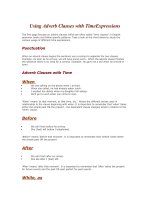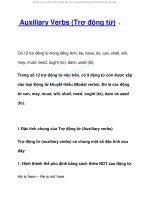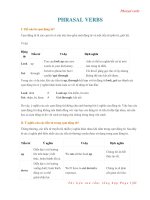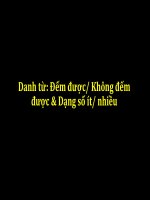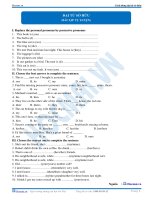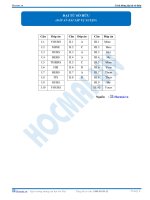tài liệu về relative clauses
Bạn đang xem bản rút gọn của tài liệu. Xem và tải ngay bản đầy đủ của tài liệu tại đây (73.97 KB, 6 trang )
RELATIVE CLAUSE
I/ Relative pronouns:
Who ,whom, which, where, when, whose ,why , what, that .
II/Relative clauses:
1/ The Relative pronounis the subject of the relative clause :
Ex : I don't like the man . He lives next door .
> I don't like the man who lives next door.
I don't like the book . It tells about a famous actor.
> I don't like the book which tells about a famous actor.
NOTE:"That" can replace " who" and " which"
The relative pronoun can't be omitted.
2/ The relative pronoun is the object of the relative clause :
Ex: Have you read the book ?. I lent you that book last week.
> Have you read the book which I lent you last week ?
I like the shirt . You are wearing it.
> I like the shirt which you are wearing.
NOTE:
"That" can replace " Who"," whom" and " which".
The relative pronoun can be omitted.
3/ The relative clause with preposition:
Ex:I don't like the hotel . We are living in that hotel
> I don't like the hotel which we are living in.
(OR) > I don't like the hotel in which we are living.
That girl is my sister.You are talking about her
> The girl who/(whom)you are talking about is my sister.
(OR) > The girl about whom you are talking is my sister.
NOTE:
" That"can replace "who" ," whom" and " which" when the preposition is at the
end of the relative clause.
In formal English preposition are pled before the relative pronoun.
III/There are 3 kinds of relative clause : Defining, non- defining and
connective.A/Defining relative clauses :
1/ A defining relative clause specifies which person or thing we mean . It
can not be separated from the person or thing it describes
Ex:
The man who told me this refused to give me his name
( "Who told me this " is a defining relative clause . If we omit this . it is not
clear what the man talking about )
Notice that there is no comma between a noun and a defining relative clause.
-Defining relative clause usually follow "the"+ Noun but they can be also be
used with " a/an" + noun, plural nouns without "the" and the pronouns : all,
none , anybody , somebody and those .
-Clauses following " a/an"+ noun , plural nouns without
"the/somebody/someone" sometimes define their noun/ pronoun only
indirectly.The noun/ pronoun in these cases is usually the object of a verb or
preposition.
Ex:
A doctor is a person/ someone who gives patients medical treatment.
I met a person who said he knew you.
-Sometimes these clauses are separated from their noun/ pronoun by a word or
phrase
Ex:
I saw something in the paper which would interest you
-But normally, relative clauses should be placed directly after their noun
/pronoun
Ex :
Is there anything i can do to help ?
The noise that he made woke everybody up.
2/ Relative pronouns used in defining relative clauses :
+/ For persons Subject :who /that
Object : who/whom/that
possesive : whose
a/ Subject : who/ that
"Who" is normally used but "that" is a possible alternative after " all/ everyone/
everybody/noone/ nobody/ those
Ex:
The man who has just come is our headmaster .
Only those who had booked in advance were allowed in.
b/ Object of a verb :Who/whom/that"Whom" is the Object form of " who"
and is used formally in object clauses
Ex:
He is a person whom you can rely on
-However, this is noun felt to be excessively formal by most speakers and "
who" is commonly used instead ( that is more usual than "who").And it is still
more common to omit the object pronoun altogether.
Ex:
The man whom i saw told me to come back today.
(OR) The man who i saw /The man i saw / The man that i saw
c/ With a preposition : Whom/ that
- In formal English " whom" has to be used if it follows a preposition.
Ex :
To whom Am I speaking?
-In formal speech , however, it is more usual to move the preposition to the end
of the clause. "Whom" then is often replaced by " that", but it's still common to
omit the relative altogether.
Ex:
The man to whon i spoke.
(OR) The man who/ whom i spoke to
(OR) The man that i spoke to/ The man i spoke to
-However , in everyday use, it's usual to avoid this kind of construction
Ex:
Who am i speaking to?
d/Possessive :
- Whose = " of whom" and "whose" is the only possible form
Ex:
Several guests whose rooms had been broken into complained to the manager.
For things :
Subject :which ,that
Object : which , that
Possessive : whose , of which
a/ Subject : Which/ that
-There are alternatives in a defining clause . although " which " is felt to be
more formal
Ex :
By 9.30 there was only one painting that hadn't been sold . This is the
picture which / that caused such a sensation .
b/Object of a verb : Which /that ( or no relative at all)
We use " that" instead of "which " because " which " is hardly ever used after
"all , everything , little , much, none, no " and compounds of no or after
superlatives . We can use "that" or omit the relative altogether , if it is the object
of a verb .
Ex :
She is one of the kindest people ( that) i know .
Is there anything (that) he wants to be served ?
c/ Object of a preposition :
The formal construction is preposition + which , but it is more usual to move the
preposition to the end of the clause , using " which /that" or omitting the relative
altogether .
Ex :
The ladder on which I was standing began to clip .
(OR) The ladder which /that I was standing on began to clip.
d/ Possessive : "hose+ a clause" is possible but "with + a phrase is more usual .
Ex :
A house whose walls were made of glass
(OR) A House with glass walls
3/ Cleft sentences : It+ be + noun/ pronoun+ defining relative clause
-When the subject is a proper noun , "that" is more usual than "who".With all
other objects , "that" is the correct form
Ex :
It's the girl that stole my money.
It's Anna that i saw.
-"That" is usual for non_ personal object .
Ex :
It's speed that causes accidents , not bad road .
B/Non-Defining R.C :
1/ A non-defining r.c contains extra information :
- In writing it is seperated by comma ,and in speech , if use " at all", is usually
indicated by intonation .
Ex :
A train , which was already an hour late,broke down again .
-Non-defining r.c are placed after nouns which are definitely "already" .They do
not therefore define the noun, but merely add something to it by giving some
more information about it .
-Unlike Defining r.c , they are not essential in the sentence and can be omitted
without causing confusion .The pronoun can never be omitted in a non-defining
clause .
NoTice that we put a comma between a noun and a non-defining clause and
another comma at the end of this clause if it is not also at the end of the sentence
.
2/Relative pronouns used in non-defining r.c :
For Persons :
Subject :Who
Object :whom/ who
Possesive :Whose
a/ Subject :who-We use "who" as the subject of the clause
Ex:
Peter ,who had been driving all day, suggested stopping at the next turn .
Notice that :
Clauses such as these ,which come immediately after the subject of the main
verb . In spoken English we would be more likely to say :
Peter had been driving all day so he suggested stopping
at the next turn.
Clauses following "a preposition +Noun " are also common .
Ex:
I passed the letter to Peter ,who was sitting next to me .
b/Object :who/whom
-We used "who/whom " as the subject of the main clause although "whom" is
more formal and rarely used in spoken English .The pronoun can't be omitted .
Ex :
Peter , who/whom I admire , is going to visit the university next week .
But non-defining clauses , coming later in the sentence , after the object of the
main verb or after a preposition+noun , are common in conversation .
Ex :
She introduced me to her husband ,whom i hadn't met before .
c/ Object of a preposition
-The preposition is normally placed before "whom" and the pronoun can't be
omitted .
Ex:
Mr Richard , for whom i was working , was vey generous.
It is however possible to move the preposition to the end of the clause . This is
commonly done in conversation and "who" then finally take the place of "
whom"
Ex:
Mr Richard , who i was working for , was generous.
If the clause contains the expression of time or place , this will remain at the
end.
Ex:
John , with whom i played tennis last week, was fatter than me .
John , who /whom i played tennis with last week , was fatter than me .
d/Possesive:whose
Ex :Ann, whose children are at school all day , is trying to get a job .
Note:"All , both , most, few , several, some "+of + whom/ which< This
form can be both used for people and things.
-When we want to add information about the whole or the part of a particular
number of things or people , we can use the non-defining r.c with " of which/of
whom" after words such as :"all,both,each,many,most,neither,none,part,som e ,
(a number ne ,two. thee, ,the first ,the second , ,a half , a third , )and
superlatives ( the best , the biggest, )
Ex:
Her sons , both of whom study abroad , ring her up every week.
The busses, most of which are already full, were surrounded by an angry crowd.
